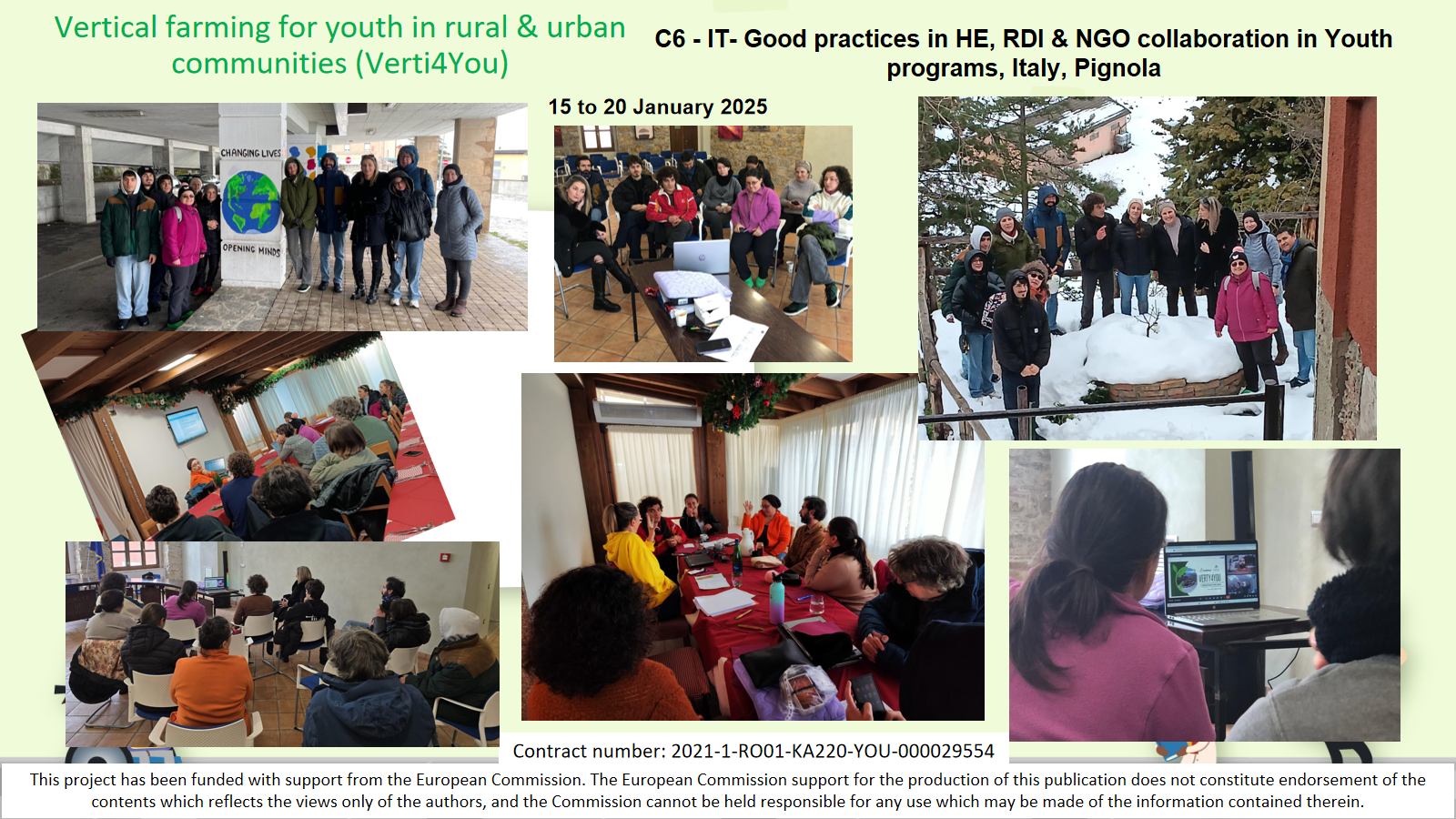Learning, Teaching, and Training Activities
March 20 – 24, 2023, USAMV Bucharest & Ultragreens, Romania
Between March 20th and 24th, 2023, the Verti4You consortium implemented the first Learning, Teaching, and Training Activity (C1), titled Youth Workers & Trainers Mentoring Event (Training of Trainers). The event was hosted by the University of Agronomic Sciences and Veterinary Medicine (USAMV) of Bucharest and co-organized with the project’s associated partner Ultragreens Romania.
This training session gathered youth workers and trainers from all partner countries (Romania, Bulgaria, Greece, and Italy) and served as a preparatory mobility for the upcoming blended training sessions targeting NEET youth. The goal of the event was to build the participants’ capacity to deliver vertical farming and microgreens-based training.
The program included a balanced combination of theoretical modules and field-based sessions. Participants were introduced to vertical farming models, microgreens cultivation technologies, pest and disease management, and youth-focused community engagement strategies. Hands-on workshops were held at Ultragreens’ professional facilities in Fânari and Ploiești, where participants learned how to use the MicroSera vertical farming units, perform seeding, harvesting, and system maintenance, and design applied training for disadvantaged youth groups.
The C1 event also provided opportunities for participants to discuss the challenges of youth inclusion in rural and urban areas, share national experiences, and prepare concrete training scenarios for future use. The final day was dedicated to presenting the project’s digital resources, exchanging feedback, and drafting common guidelines for replicating training activities across all partner countries, followed by a friendly photo session for awarding the certificates of participation by USAMV Bucharest.
We hope participants returned to their institutions with ready-to-implement knowledge, tools, and action plans.
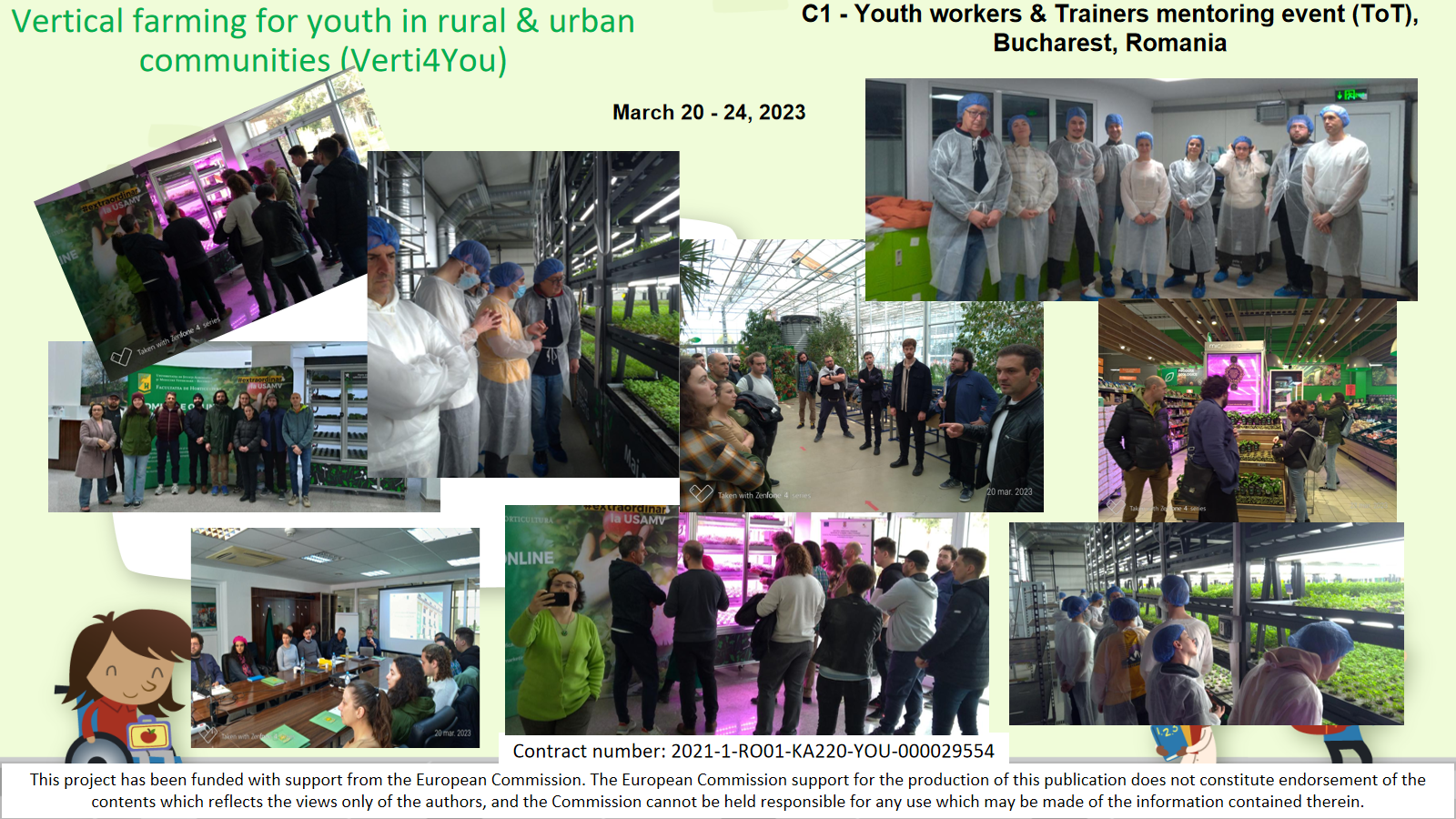
21 June – 2 July 2023, Friends of Children of Romania & Ultragreens, Romania
The second Learning, Teaching, and Training Activity (C2) of the Verti4You project was implemented in Hârja, a small village in Bacău County, Romania, between June 21st and July 1st, 2023. The training was coordinated by the Friends of Children of Romania, and supported by trainers from USAMV Bucharest, INMA Bucharest and ICDPP Bucharest. A number of 32 young participants, aged 16 to 25 years old, from Romania, Bulgaria, Greece, and Italy were present
The main objective of this LTT was to enhance young people’s practical skills and entrepreneurial thinking through applied learning in vertical farming and microgreens production, in connection with environmental awareness and digital innovation. In eleven training days, participants engaged in both theoretical modules and field-based practice, following a structured program designed to simulate real conditions of indoor horticultural production.
The training covered a full vertical farming production cycle, enabling participants to follow the process “from seed to harvest”, including substrate preparation, sowing, germination control, watering management, transfer into vertical modules (Microsera), maintenance, and harvesting. Achieving a full growth cycle during the training period required continuous monitoring and task division among participants, and represented a unique opportunity for direct application of the learned concepts.
Throughout the sessions, participants were introduced to the principles of vertical farming systems and their components, including lighting, irrigation, ventilation, fertigation, and microclimate control. The cultivation techniques used were adapted to indoor microgreens production and were accompanied by explanations related to pest and mold prevention, hygiene protocols, and the nutritional value of the harvested crops. In parallel, the programme integrated modules on social entrepreneurship, which included guided exercises on business model design, value chain structuring, marketing strategies, sustainability planning, and community-oriented innovation. These sessions were facilitated in a non-formal and interactive style, supporting creativity, collaboration, and critical thinking. Creative and reflective activities were embedded into the daily agenda, with elements such as the “Adopt a Pot” concept, where each participant managed and followed the evolution of their own crop; the “Eco-Challenge”, using recycled materials for practical tasks; and collaborative storytelling exercises like “Story Stew” or “Three Word Story”, aimed at developing soft skills and group cohesion.
Participants also engaged in environmental awareness actions, such as a river clean-up and thematic discussions on climate responsibility. Group dynamics were strengthened through energizers, traditional games, open-air debates, and common tasks related to the training setup. The training took place in an educational facility located in a fully natural environment, combining traditional rural housing and tents with functional vertical farming infrastructure. This setting allowed participants to understand how modern horticultural technologies can be implemented in both urban and remote rural contexts. At the end of the LTT, participants harvested and tasted the microgreens they had cultivated and reflected on the potential applications of what they had learned and they had a full day for learning in the field how to sell microgreens to the market. They also participated in real-life Selesperson experiment, taking microgreen boxes and presenting them to che most famous chefs in restorants in Onesti city.

The third Learning, Teaching, and Training Activity (C3) under the Verti4You project was organized by Agrolink Bulgaria and implemented in the village of Lik, a rural area located in the northern part of Bulgaria, near the Stara Planina mountains. The training gathered 22 young participants aged 16–25 from Bulgaria, Romania, Italy, and Greece for an 11-day residential learning experience that combined vertical farming with environmental awareness and social entrepreneurship education.
The core of the programme was hosted at the biodynamic farm “Versol”, which provided a fully functional demonstration site for microgreens production and sustainable food systems. Over the course of the training, participants engaged in hands-on sessions that covered the full cultivation cycle of microgreens — from seed to harvest — including substrate preparation, sowing, irrigation, germination monitoring, climate control, and harvesting. Completing this full cycle within the time frame of the training was a significant achievement, as it required constant care, discipline, and the division of responsibilities within the group.
Daily activities integrated both technical sessions and creative methodologies. Participants learned about automation in vertical farming, lighting and ventilation systems, pest and disease management, the nutritional value of microgreens, and the principles of ecological and biodynamic production. The program also included structured workshops on social entrepreneurship, where participants explored business planning, value proposition development, and client engagement through role-play and team challenges.
The mobility was shaped around an immersive, community-based approach. Each day began with energizers or movement-based exercises and ended with structured reflection activities such as the “Memory Game”, “Story Stew” or “Three Word Story”, aimed at reinforcing learning outcomes and building group cohesion. Participants were encouraged to contribute to the construction and maintenance of MicroSera modules, to take part in an eco-challenge using recycled materials, and to volunteer by preparing fresh produce for a local residential centre for children and youth with disabilities.
The training venue combined practical work in the greenhouses and vertical units with accommodations in local guesthouses, where meals were prepared from locally sourced and organic products. Participants were also introduced to Bulgarian cultural traditions, crafts, and language elements through intercultural evenings and community interactions.
Throughout the training, young people developed technical, entrepreneurial, and transversal skills aligned with the project’s objectives. The activity concluded with a harvesting session and evaluation workshop, followed by a mentoring phase aimed at supporting participants in applying their learning within their own communities and future initiatives.
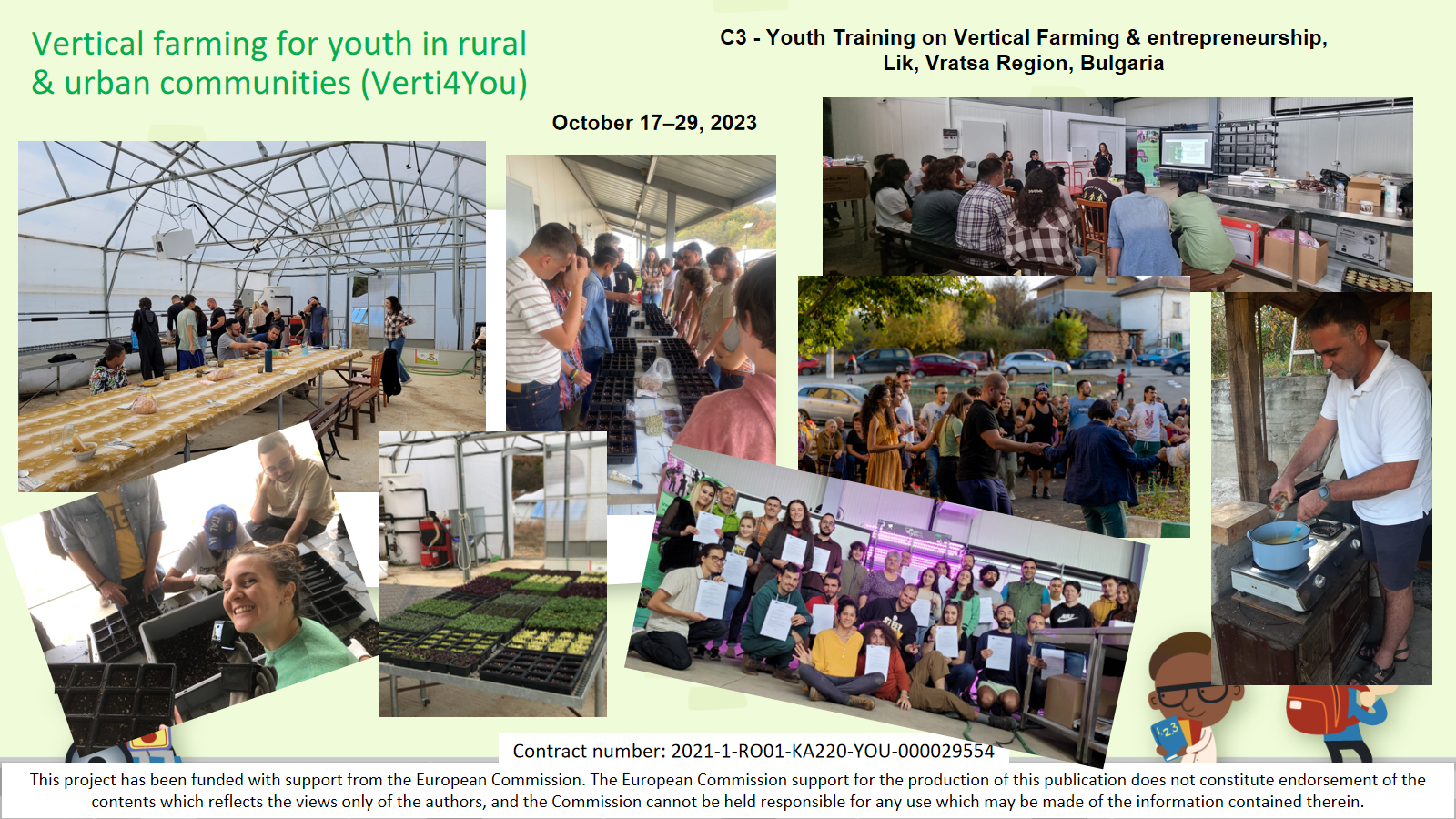
The fourth Learning, Teaching, and Training Activity (C4) of the Verti4You project took place in Pignola, a small town located in the Basilicata region of southern Italy. Organized by World Net Exchange in collaboration with FoRC, Agrolimk, Hopeland, USAMV Bucharest, INMA and ICDPP Romania, the training brought together 17 young participants from Italy, Romania, Greece, and Bulgaria, guided by 7 trainers from academic and civil society organisations.
Over the course of 13 days, participants explored innovative practices in vertical farming, microgreens cultivation, environmental education, and social entrepreneurship. The program was designed to promote teamwork, experimentation and intercultural dialogue, all embedded in the context of a heritage community and a deeply immersive learning environment.
A central element of the training consisted in the construction of two raised-bed garden installations, fully designed and implemented by the young participants. Divided into two teams – “Green Fingers” and “Konoha” – trainees were challenged to conceptualize, build and maintain garden structures using local and recycled materials. The gardens were established in sloped, non-conventional areas of the village, highlighting the adaptability of vertical farming solutions even in topographically complex or underused spaces. These practical tasks promoted creativity, responsibility and collaboration, and resulted in the creation of two educational and productive spaces that remained in the community after the project.
In parallel, participants followed the complete cycle of microgreens production, from substrate preparation and sowing to germination, maintenance, harvesting, packaging and delivery. This allowed them to test in real time the functioning of vertical modules and to understand their environmental, economic and nutritional implications. Alongside technical training, sessions were dedicated to pest and disease identification, hydroponic systems, climate control in indoor farming, lighting, automation and vertical module maintenance.
Entrepreneurial modules were strongly embedded in the program. Through storytelling, simulation, role-play and negotiation games, participants developed concrete business ideas and worked in teams to understand social impact models, customer targeting, sustainability planning, and cost–benefit analysis. The physical mobility was complemented by an online follow-up phase, during which trainees continued to work on their ideas and received guidance from local mentors and international facilitators.
Cultural and community-based learning played a key role throughout the training. Activities included outreach visits to local businesses, games rooted in Italian traditions, shared reflection circles, nature walks and culinary sessions using the harvested greens. Participants were hosted at the YOUROPE hostel and took part in daily collective moments that fostered cohesion, empathy and openness to diversity.
The C4 activity offered a transformative learning experience for all participants. It combined high-level technical instruction with social creativity and placed young people at the centre of a process of regeneration and co-creation, in which agriculture, innovation and community values intersected in meaningful ways.
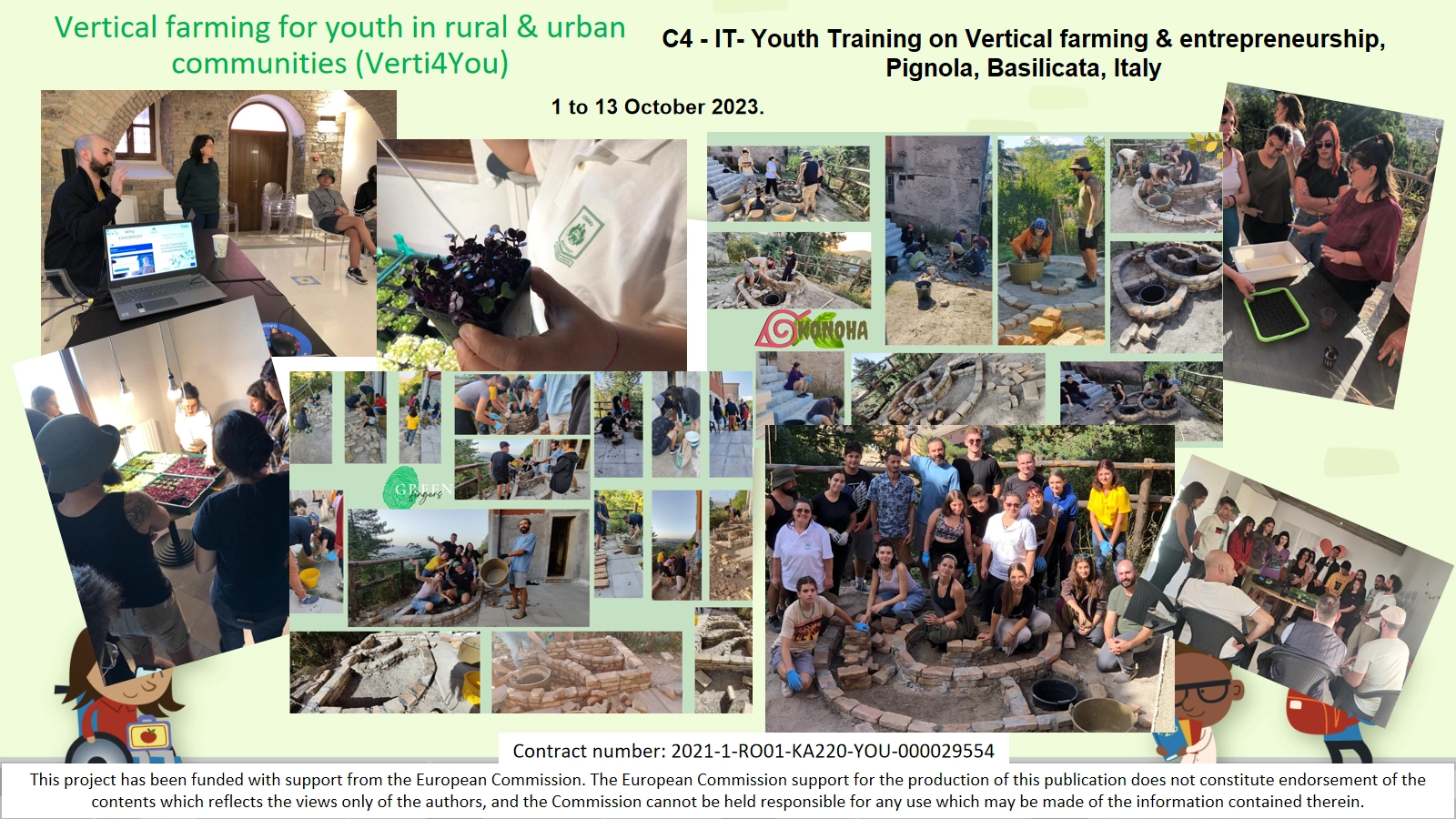
The fifth and final Learning, Teaching, and Training Activity (C5) within the Verti4You project took place between September 3rd and 15th, 2023, in Hopeland — an off-grid eco-community located in the arid hills of Malandreni, in the Argolis region of Greece. The activity was hosted by the local partner organisation and brought together 22 young participants from Greece, Romania, Bulgaria, and Italy, accompanied by a team of seven trainers, youth workers and mentors from academic and civic backgrounds.
This LTT provided an exceptional learning context, pushing the boundaries of traditional training environments by placing the participants in an ecosystem without access to mains electricity, internet or conventional infrastructure. Despite extreme conditions — heat, dry air, minimal rainfall and limited energy — the group successfully implemented a vertical microgreens production system, proving that innovation, adaptability and teamwork can overcome resource limitations.
During the 11-day residential training, participants engaged in full-cycle microgreens production, starting from soil preparation and seeding, continuing with irrigation and germination management, and culminating in harvesting, packaging and distribution. The vertical modules were designed and adapted by the group using recycled and natural materials available on site, and were maintained entirely with manually controlled systems and low-impact irrigation methods.
The programme incorporated daily technical workshops on indoor farming, automation systems, pest and disease management, the nutritional properties of microgreens, and homemade hydroponic solutions. Alongside these, the training developed participants’ entrepreneurial mindset through creative methods such as storytelling games, role play simulations, negotiation challenges and teamwork exercises.
Hopeland’s educational philosophy deeply influenced the delivery of the training. Participants lived in teepee tents and cooked together, shared water and electricity carefully, and learned through direct experience what it means to live in balance with nature. The training days were marked by collective rituals, physical movement sessions, and daily reflection games such as “Story Stew” or “Memory Game”, designed to consolidate knowledge in an embodied and memorable way.
One of the highlights of the training was the construction of a community nest — a symbolic and functional resting space woven with natural materials by the group, intended to offer emotional safety and a place for introspection throughout the programme. This, along with the vertical farming installations built and operated entirely by the participants, remained as tangible contributions to Hopeland’s infrastructure and as a legacy of the Verti4You learning experience.
This final LTT closed the training series of the project with a powerful message: vertical agriculture is not only for high-tech environments, but can become a transformative practice in remote and harsh territories, offering youth tools for resilience, creativity and eco-social innovation.
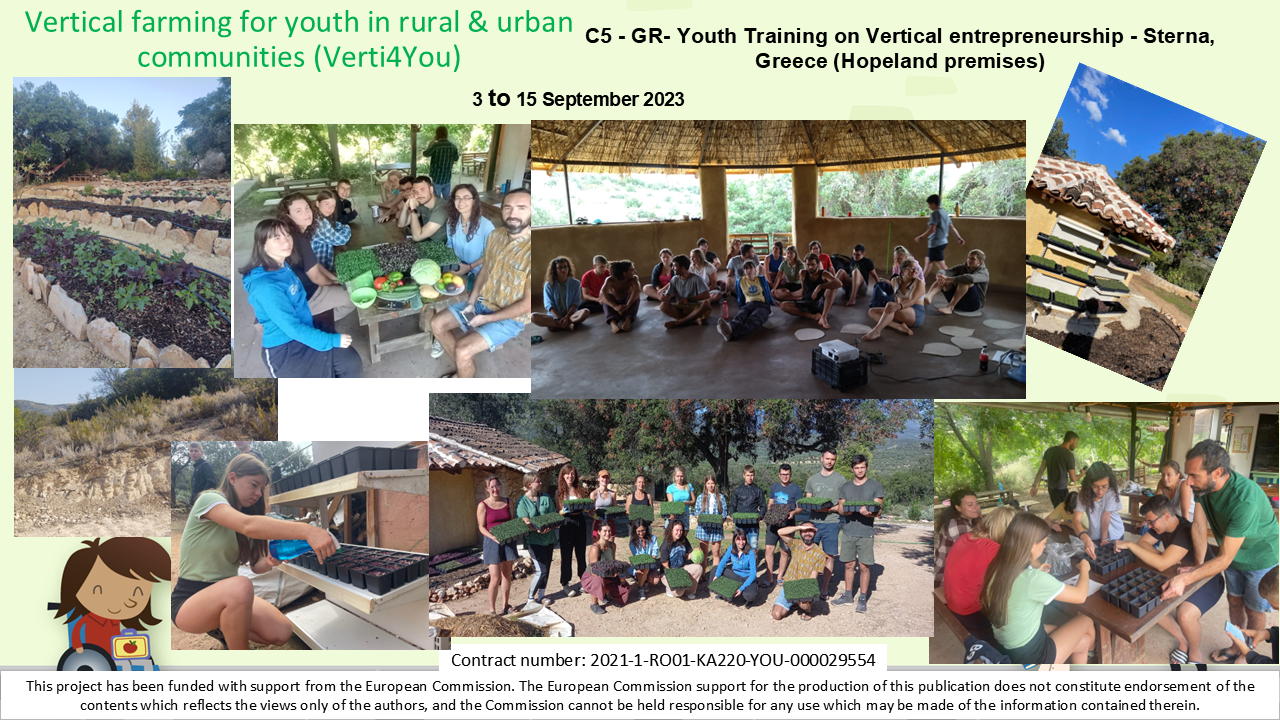
The final learning and coordination event within the Verti4You project took place between January 16th and 20th, 2025, in Pignola, Italy, and brought together representatives of all partner institutions – USAMV Bucharest, University of Forestry Sofia, INMA, ICDPP, World Net, Hopeland, FORC, and the associated partner Ultragreens – for a joint Learning, Teaching and Training Activity (C6) followed by the last Transnational Project Meeting (TPM).
This LTT was designed as a space for reflection, strategic capitalization and planning. It focused on the exchange of good practices in the collaboration between higher education institutions, research institutes and NGOs, highlighting challenges and success factors in youth-focused Erasmus+ projects. The sessions included case studies from each country, examples of working methodologies, and discussions on adapting training tools to diverse learning environments and organisational cultures.
A core component of the programme was the presentation of a proposed third intellectual output (R3) – a practical guide compiling lessons learned, critical incidents, and tested solutions from the Verti4You experience. This new material is meant to serve future project managers and facilitators interested in launching similar transnational initiatives with complex stakeholder configurations. The guide will address topics such as communication between academic and non-academic actors, responsibility sharing, quality control, and youth engagement in mixed formal/non-formal ecosystems.
Throughout the training, participants contributed to a series of thematic sessions covering microgreens education, entrepreneurship, NEET inclusion, stakeholder engagement, and long-term sustainability. Discussions revealed common challenges, such as aligning academic procedures with NGO flexibility, the use of digital tools in low-access areas, and the adaptation of vertical farming practices to vulnerable (autistic) or marginalised communities.
One of the unique aspects of the event was the presence of the project’s core facilitator, who had participated in all five previous LTTs and provided key insights into the evolution of the group’s dynamics, youth needs and effective facilitation practices. His contribution helped synthesize a transversal perspective on the project’s human dimension and learning impact.
In the final part of the event, participants also engaged with representatives of the Pignola Municipality, who emphasized the ongoing interest of local authorities in supporting projects like Verti4You – initiatives that promote youth inclusion, technological education and sustainable food systems, while also contributing to community revitalization. The group also met with a local environmental association active in the Lago del Pantano protected area, a site of ecological and legal significance, which provided further insight into the region’s commitment to conservation, biodiversity and integrated rural development.
The event concluded with a roundtable on future collaboration, where most partners expressed their commitment to developing follow-up projects in the youth sector. Proposed directions include digital empowerment of disadvantaged young people, new models of vocational training in agriculture, and the scaling of vertical farming as a tool for inclusion, local production, and sustainability.
